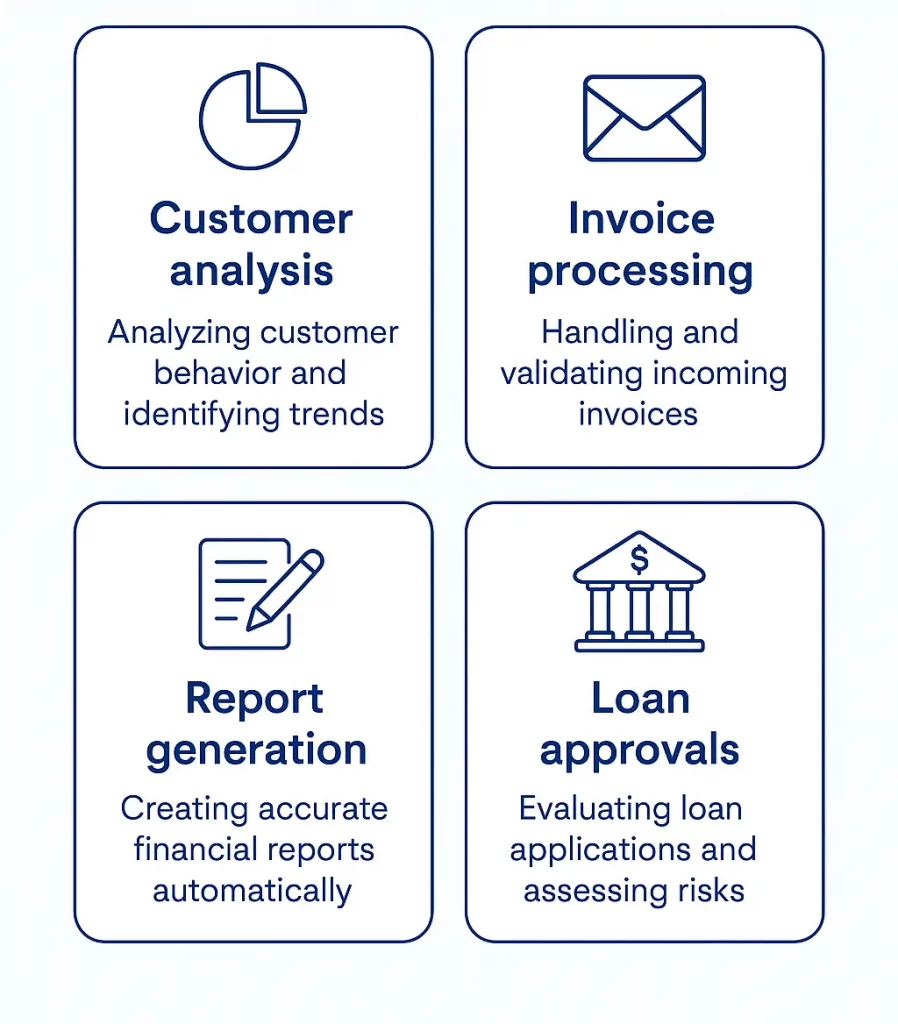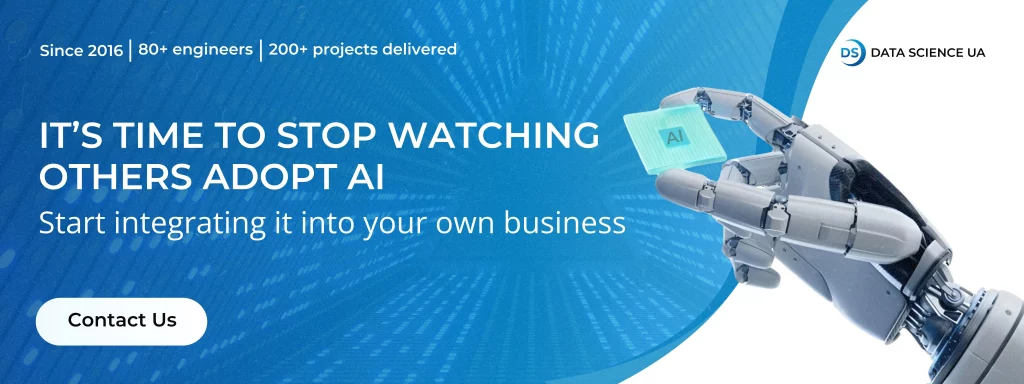AI agents in finance: How autonomous systems are changing finance teams
Financial reports are generated without the analyst’s involvement. Transactions are verified in seconds, and audit-ready records are available at any moment. Budget planning that takes into account real-time market fluctuations, not just historical data. This is not a utopian concept – this is the new reality for companies actively implementing AI agents for finance.
While conventional AI systems wait for clear commands, leading AI finance agents for companies move through each stage of the process independently to reach a set goal. They identify an issue, seek a solution, adapt to context clues in the process, verify the result, and learn from every case. In finance, where everything is based on accuracy, speed, and a continuous flow of data, such tools are already providing a real advantage. Looking to step up your game and implement similar technology in your business? With an AI agent development company this process becomes a breeze and brings tangible results!
However, it’s never a good idea to make bold moves without due preparation. Let’s explore how AI agents for finance work in real life and why exactly they become the industry’s new go-to instrument.
How do AI agents work in finance?
Before reading this article, have you ever wondered how a finance AI agent works? You probably imagined an image of a soulless robot waiting for a clear command, following it step by step, and freezing up as soon as something unusual happens. But is it really true?
Of course not! AI agents for finance act independently, like an experienced analyst. They analyse reports, check payments, record risks, and talk to customers – all without pings in Slack and instructions for each step.
The agent sees the problem, understands the context, and offers a solution. If necessary, they turn to a ‘colleague’ agent, check the data, and adapt the strategy. And only then does it act. Quietly, quickly, and efficiently. This is exactly what many companies are lacking today.
4 classic cases in fintech where AI agents are indispensable
AI agents for finance are becoming indispensable wherever there are large volumes of routine data, critical deadlines, and a need for accuracy. Most often, this goes for back offices, responsible for payments, reports, regulatory compliance, and customer service.
At Data Science UA, we see that the demand for agents is growing from the financial business: there are resources, real pain, and a high cost of error. That is why our Fintech AI development services are one of the most requested areas today.

Where exactly you can use AI in fintech?
Scenario 1: Agents process invoices without an accountant
Hundreds of invoices pass through financial systems every day. The usual approach is for an accountant to manually open each document, check it against contracts, copy it into the ERP, and send it to another department.
An AI agent acts differently: it recognises the invoice, checks the data, compares it with the payment history, and acts autonomously. If there’s a discrepancy, it immediately notifies a responsible professional: ‘The amount stated doesn’t match the contract terms’ or ‘The counterparty has unverified payment credentials.’ The result? Higher speed, better accuracy, and informed decisions made with no additional hassle for a dedicated expert.
Siemens: Top AI agents for finance process tens of thousands of invoices per month
Inside Siemens’ finance department runs an AI module integrated with their SAP ERP system. It scans and processes more than 20,000 incoming invoices every day.
How this AI agent works:
- Reads data from PDFs and electronic invoices using OCR.
- Compares the details with the terms of the contract.
- Checks VAT, payment terms, and recipient details.
- In case of deviations, it automatically sends an enquiry to the responsible employee.
Result:
Time spent on processing a single invoice has been reduced from 10-15 minutes to just 1. When it comes to real-world scenarios we’re talking hours of work saved. And all of this with an error rate less then 1%!
Scenario 2: AI agents against financial fraud
A classic example: a $47,000 transaction takes place at 3 am from an IP address that has not been used before. The system misses the payment, and a human notices the problem a few days later.
The agent sees it differently. It immediately compares the IP with the previous ones, takes into account location, time, type of spending, and suspicious patterns of user behaviour. And it doesn’t just block – it also creates an incident in the system, notifies the compliance team, and stores the full history. Without delays. Without added risks.
Mastercard: AI agents analyse transactions in real time
What the agent does:
On each transaction, an AI assessment is run on 200+ parameters: location, user behaviour, history, device, and payment frequency.
The agent not only blocks suspicious actions, but also learns in the process, adapting to the customer.
Example:
If a user has made all of their previous payments from Warsaw but at 3:15 AM there]s a sudden request for a $42,000 transaction from Thailand, an AI agent automatically marks the procedure as high-risk, blocks it, and immediately notifies the user and responsible staff.
Result:
Reduced false positives by 50%. Increased antifraud filter accuracy to 95%+.
Scenario 3: Forecasting finances based on real data
Budget season often looks like this: ‘Dump your Excel spreadsheets, let’s put everything in one table, then we’ll calculate the trends of the past year and add 10% for marketing.’
An AI agent presents a different approach.It ‘sees’ the full picture and even beyond that: factual revenues, payment history, seasonality factors, demand fluctuations, exchange rates, and purchase details. Based on all of this complex data, it generates comprehensive cash flow scenarios. Not just abstract assumptions, but quite specific prognoses: ‘In 3 weeks, the account will have X$, if you don’t postpone this purchase.’ All calculations are transparent and the logic behind them is explained.
Intuit (QuickBooks): cash flow forecasting for small businesses
AI agent finance feature:
- Combines information from bank accounts, CRM, historical sales, expenses, and taxes.
- Builds forecasts 30-90 days ahead.
Issue alerts:
‘Your invoice will drop below $0 in 9 days if you don’t reschedule your vendor payment.’
‘Recommend invoicing Acme customer for $12,430 – delayed more than 20 days.’
Result:
Small businesses respond faster to potential cash gaps, rely less on an accountant, and avoid delinquent taxes.

How to forecast finances based on real data?
Scenario 4: A digital assistant for customers that won’t say ‘wait for the operator’
Imagine a bank customer who wants to know why a payment hasn’t been received on a weekend. Instead of a standard notification telling them to wait, the customer gets a prompt, accurate response from an AI agent. Behind the scenes, it has already connected to CRM, checked the transfer status, analyzed transaction logs, and determined that the delay is caused by an error in the IBAN.
If there’s a more complex request, it’s automatically passed to human operators. Not as a blank query, but rather a report put in context with a dialogue summary, customer details, and necessary explanations. But not from scratch, but with context, screens, and explanations. The operator only has to resolve the issue and not waste time on clarification.
Bank of America: Erica – a digital AI agent for customers
What Erica does:
- Prompt you: where there’s a delay on a payment.
- Show commissions and spend for the month.
- Do analytics: ‘You spent 22% more on restaurants than you did last month.’
- Checks IBAN, helps restore access, and updates data.
- Embeds itself in the correspondence process, does not pass an empty enquiry to the operator, but with context and data.
Result:
70% of requests are solved without human intervention. Call center workload is reduced by 30%
The benefits of AI in finance
Decisions based on data, not assumptions
Most strategic mistakes in business arise not because there is a lack of data, but because it’s not utilized properly. AI is changing this dynamic: instead of ‘I think’ it’s ‘Data shows.’. Algorithms analyze financial flows, customer behaviour, and sales cycles, and draw conclusions that cannot be disputed. This means fewer intuitive decisions and more informed strategies.
The speed that saves weeks
It may take hours for a human professional to find an inaccuracy hidden between thousands of Excel lines or forecast cash flow for a quarter ahead. AI, on the other hand, does it in minutes. Automating mundane tasks and speeding up complex processes is what’s behind the increased efficiency of teams that have already implemented agent-based systems.
In finance, a mistake is a risk of losing money, a client, or a reputation. AI models work with mathematical precision, detect anomalies, automatically check data, and compare results with previous periods. This significantly reduces the risk of human error, especially during stressful periods such as month-end or audit.
Scalability without stress
Workload always grows along the company. But this doesn’t necessarily mean staff expansion. AI allows you to scale processes without significant cost increase. New markets, more customers, more data – but the team’s workload does not triple. It gives room for development without internal burnout.
AI agent vs RPA in finance
| Criterion | AI agents in finance industry | RPA in finance industry |
| Functionality | Financial analyst and advisor | Digital accountant |
| Document processing | Recognises cheques, invoices, contracts of any format | Processes standardised forms and documents |
| Cost analysis | Finds hidden patterns and anomalies | Categorises expenses according to established rules |
| Forecasting | Predicts cash gaps, seasonal fluctuations | Generates reports based on historical data |
| Debt management | Assesses risks, offers collection strategies | Sends automatic reminders |
| Tax planning | Optimises tax strategies, takes into account changes in legislation | Fills in declarations using templates |
| Digital banking | Analyses statements, identifies suspicious transactions | Reconciles balances, transfers data |
| Budgeting | Creates dynamic budgets, adapts to changes | Monitors compliance with approved limits |
| Investment decisions | Analyses markets, assesses portfolio risks | Performs typical securities transactions |
| Cost control | Identifies unproductive expenses, offers optimisation | Verifies compliance with expense policy |
| Customer service | Advises on financial issues, personalises offers | Processes payments, sends |
| Reporting | Creates analytical reports with conclusions | Generates standard financial reports |
| Reaction to changes | Adapts to new market conditions | Needs to be updated when procedures change |
| Cost of error | May misinterpret data | Error in calculations due to software crash |
| Payback time | 6-12 months due to complex analytical capabilities | 3-6 months due to fast automation |
| Small business examples | Cash flow forecasts, product profitability analysis | Automatic invoice creation, bank statement reconciliation |
| Data requirements | Works with incomplete or inaccurate data | Requires well-structured data |
| Scalability | Grows with the business | Needs to be customised for new processes |
How do AI agents work in finance?
Data collection and processing
The first step is to teach the agent to ‘look’ at the business the way a CFO does. It extracts information from CRM, ERP, bank statements, Excel files, and partner APIs. Next comes standardisation, cleaning, and the formation of a single source of truth. It is important not just to accumulate numbers, but to make them analysis-ready.
Machine learning algorithms
When the data is prepared, models come into play. They predict profitability, risks, payment delays, and optimization options. This technology includes regression, classification, and segmentation – all depending on the business task. With Machine Learning services there’s no need for you to dive deep into complex algorithms – our dedicated professionals are here to bridge the gap between innovation and your company’s needs.
Image processing
Even in finance, visuals matter. The need for recognizing an invoice from a scan, identifying signatures, or verifying documents is still present – while the manual approach is long gone. Such cases are solved with image processing services, which simplifies document flow greatly, especially on a larger scale.
Natural language processing
AI no longer just reads numbers – it understands speech. You can configure an agent to process emails from customers, highlight important details, respond to inquiries about the status of payments, or generate reports in ‘human language’. These features are implemented through Natural language processing services.
Automation systems
All of these tools are combined into complete scenarios: agents don’t just analyse – they act. They automatically create tasks, transfer data to the financial system, generate responses to customers, and compile reports. This is the full integration of AI development services into business processes, which frees the team from routine and allows them to focus on strategic tasks.
Barriers and risks of implementing AI agents in finance 2025
Uneven start: Data quality and chaos in systems
No agent will show high performance if the dataset is a chaotic set of irrelevant spreadsheets, a CRM is just confusing customer statuses all over, and an accounting system was last updated in 2015.
Even the most rigorously designed model won’t work if it is trained on low-quality data. The first challenge is to put data sources in order and establish an exchange between systems. This is where everything often comes up: duplicates, manual input, and date errors.
Regulation: AI agents in corporate finance love freedom, but the sector doesn’t
Financial data is not just numbers; it is a matter of reputation, legal risks, and customer trust. AI agents that automatically process payments, perform KYC checks, or interact with customers must work within clear boundaries.
Regulatory requirements – from GDPR to financial monitoring – impose restrictions on the collection, storage, and processing of information. Therefore, an AI agent for finance should not only be ‘smart’ but also transparent, explainable, and controllable.
This is a challenge for both developers and in-house lawyers: how to ensure innovation without risking breaking the law?
Humans vs algorithms: who makes decisions?
One of the main reasons for the failure of AI projects is not technical errors but team resistance.
Financiers, accountants, and managers are professionals who have been building processes for decades. And when they are told that ‘an AI agent will do it now’, their natural reaction is scepticism or fear.
The task of the manager is not just to implement the technology, but to prepare the ground: to explain that AI is not a competitor, but a partner. Show how it removes routine and does not ‘take away work’.
And yes, during the transition period, you will have to work with an agent manually. But without this, there will be neither trust nor results.
Ethical question: Can you trust numbers with everything?
Even the most intelligent system can make biased decisions – if it has been trained on data that already has these biases. For example, if an agent is trained on historical transactions where certain categories of customers were more likely to be refused, it will automatically discriminate against them.
This is called ‘algorithmic bias’ – and for the financial sector, it is not just a mistake, but a direct path to PR crises and lawsuits.
That is why any AI solution should undergo an audit: both technical and ethical. With control, checks, and the ability to explain why the system decided a certain way.
Choose AI for you business!
What to look for when choosing an AI agent platform
Today, the market offers dozens of solutions under the label of “AI platform”, but not every one of them is capable of becoming a real AI agent for finance. To avoid buying a beautiful interface without functionality, you need to clearly understand what should be under the hood.
- Contextual autonomy. A true agent does not just perform tasks but understands the context. It does not need clarification, does not ask unnecessary questions, and finds logic in the process. If the platform forces you to “add instructions” every time, it is not an agent.
- Integration with your systems. CRM, ERP, accounting, banking gateways – all of these should be connected without any fiddling around. A platform without a proper API is a minefield for a technical disaster.
- Transparency of decisions. If the agent automatically blocks a transaction or changes the budget, you should be able to explore the cause. Explainability is critical for trust and regulatory compliance.
- Learning from your data. A good platform allows you to customize the logic to your historical data, not just work by a set script. After all, financial processes even in companies from the same market can be radically different.
What’s next: the future of AI in finance
The financial sector has always been among the pioneers of technology. However, the introduction of an AI agent for finance is a change in the model of thinking.
We can already see how agent systems replace dozens of manual processes: they predict cash gaps, warn about risky payments, and help plan budgets. And this is just the beginning.
In the next 3-5 years, we will see:
- Personal finance AI agent for every top executive or CFO – an agent that prepares reports, suggests options, and checks risks in real time.
- Dynamic budget management – not once a year, but weekly adjustments of expenses based on macroeconomics, sales forecasts, and changes in logistics.
- Hyper-automated compliance centres that detect potential violations before a request from the regulator is received.
Companies that start testing these systems now will gain more than just a technical advantage. They will create a cultural habit of working with AI, setting the ground for next-level security and efficiency for years to come.
How automation supports AI agents in banking and finance
For an agent to work efficiently, it needs infrastructure: properly configured processes, automated chains, and digital traces.
Imagine an agent that can detect an anomaly in a payment. If everything else is based on manual verification, it will be of little use. But if the agent immediately starts the withholding process, informs the responsible person, and records the incident, it saves time, money, and nerves.
Therefore, the real effect occurs when AI processes are embedded in the company’s overall digital architecture. It means:
- Processes are described and documented.
- There is digital tracking of each action.
- Integration between systems takes place without Excel imports.
Then the agent becomes part of the team. No unnecessary meetings, disputes, or nightly emails.
AI agents finance use cases are not a hype. This is a new standard.
There is no room for improvisation in finance – it requires accuracy, speed, and predictability. That is why AI agents have proven to be such an effective response to new challenges.
Instead of long chains of “manager-financier-accountant-director”, there is now an automated agent that takes over the routine, freeing up significant time for people to do tasks that really require human expertise.
This does not mean that we need to ‘replace everyone’ or abolish financial departments. But it does mean that it is no longer necessary to manually transfer figures from one report to another. It is not necessary to manually check every invoice. And it’s certainly not necessary to spend an hour every month forecasting cash flow if an agent can do it in a second.
The question is not whether your company needs an AI agent for finance. The question is when you will start testing them to keep up.
FAQ
How are AI agents applied in finance?
AI agents in finance help automate financial processes: invoice processing, fraud detection, cash flow forecasting, and customer support. They can independently analyse data, make decisions, and interact with other systems without human intervention.
What are the essential features to seek in an AI agent platform?
A reliable platform should provide integration with internal company systems, data protection, flexibility in setting up business logic, clear analytics, and scalability. Without this, the agent will work in isolation or in a very limited way.
How does automation support AI agents in finance?
Automation creates an operating environment for the agent: it removes routine, speeds up tasks, and allows the system to respond to events in real time. It is thanks to automated processes that agents can work as full-fledged digital employees.
Want to see what it looks like in practice? Contact our team, and we will show you examples from fintech.






